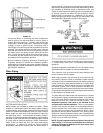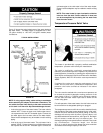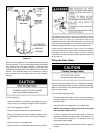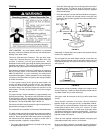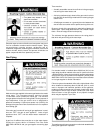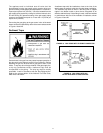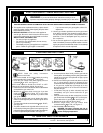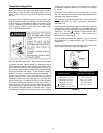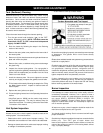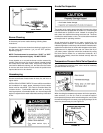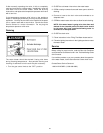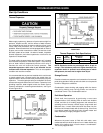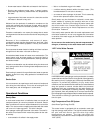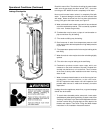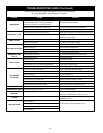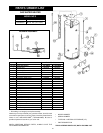
20
Tank (Sediment) Cleaning
Sediment build-up on the tank bottom may create varying
amounts of noise, and if left in the tank will cause permanent
tank failure. Once a month the heater should be flushed by
opening the drain valve and allowing two gallons of water to
drain from the heater. The inlet water valve should remain open
to maintain pressure in tank. In some water areas, you may not
be able to drain all sediment deposits by simply draining the
tank. In these cases one or both of the following methods may
be used to remove sediment:
·Clean the water heater through the cleanout opening:
1. Turn the gas control knob clockwise (
) to the “OFF”
position, depressing slightly. NOTE: The knob cannot be
turned from “PILOT” to “OFF” unless knob is depressed
slightly. DO NOT FORCE.
2. Drain the heater by following the steps in the Draining
section of this manual.
3. Remove the outer jacket cover plate from the lower side of
the heater jacket.
4. Remove six (6) hex head screws securing the tank cleanout
plate and remove the plate.
5. Remove lime, scale, or sediment using care not to damage
the glass lining.
6. Inspect the cleanout plate gasket. If a new gasket is
required, replace the gasket by contacting the Sears Service
Center with the appropriate part number from the Parts
Order List in this manual.
7. Install the cleanout plate. Be sure to tighten the screws
securely and slightly compress the gasket to avoid leaks.
8. Fill the heater with water by following the steps in the Filling
the Water Heater section. Inspect for leaks around the
cleanout plate.
9. Replace the outer jacket cover plate.
10. Follow the lighting instructions in the Operating Instructions
section.
• Mag-Erad (part no. 23600) can be used to help remove
the sediment deposits. This may be ordered from the
Sears Service Center. For ordering, refer to the Parts Order
List section of this manual.
Vent System Inspection
At least once a year a visual inspection should be made of the
venting system. You should look for:
• Obstructions which could cause improper venting. The
combustion and ventilation air flow must not be obstructed.
• Damage or deterioration which could cause improper venting
or leakage of combustion products.
• Rusted flakes around top of water heater.
Be sure the vent piping is properly connected to prevent escape
of dangerous flue gasses which could cause deadly
asphyxiation.
Obstructions and deteriorated vent systems may present serious
health risk or asphyxiation.
Chemical vapor corrosion of the flue and vent system may occur
if air for combustion contains certain chemical vapors. Spray
can propellants, cleaning solvents, refrigerator and air
conditioner refrigerants, swimming pool chemicals, calcium and
sodium chloride, waxes, bleach and process chemicals are
typical compounds which are potentially corrosive.
If when inspecting the vent system you find sooting or
deterioration, something is wrong. Call the local gas supplier to
correct the problem and clean or replace the flue and venting
before resuming operation of the water heater.
Burner Inspection
Flood damage to a water heater may not be readily visible or
immediately detectable. However, over a period of time a
flooded water heater will create dangerous conditions which
can cause DEATH, SERIOUS BODILY INJURY, OR
PROPERTY DAMAGE. Contact a Sears Service Center to
replace a flooded water heater. Do not attempt to repair the
unit! It must be replaced!
At least once a year a visual inspection should be made of the
main burner and pilot burner, see Figure 23.
You should check for sooting. Soot is not normal and will impair
proper combustion.
Soot build-up indicates a problem that requires correction before
further use. Turn “OFF” gas to water heater and
leave off until repairs are made, because failure to correct the
cause of the sooting can result in a fire causing death, serious
injury, or property damage.
SERVICE AND ADJUSTMENT



